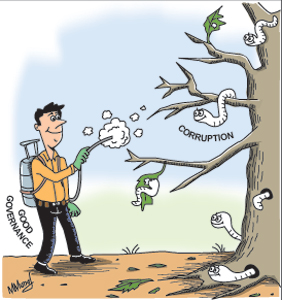Columns
Good governance vital for export growth
View(s):When economists focus on the need for good governance, rule of law, law and order, property rights and meaningful steps to mitigate corruption, there must surely be serious problems in the polity and affairs of the state. At the annual sessions of the Sri Lanka Economic Association (SLEA) on ‘Export Growth for Sustained Development’, several economists pointed out that ensuring the rule of law, good governance and independence of the judiciary was a prerequisite to achieve higher levels of export earnings.

It is widely recognised that there is a close nexus between a country’s quality of governance and the country’s economic, social and political development. Several speakers at the annual sessions pointed out that governance plays an important role in attracting investments and ensuring sustained high economic growth. Increasing the country’s exports is closely linked with issues of good governance. Poor governance and the lack of law and order could jeopardise exports and economic growth.
Poor governance
The annual sessions began with a forthright statement from senior minister and chief guest D.E.W. Gunasekera. He posed the question: “Can we expand trade and non-trade inflows?”. For this he said: “We will need good governance and rule of law”. He said the Export Development Board (EDB) Fund was not functioning. “As Chairman of the Parliamentary Committee on Public Enterprises (COPE) I inquired from the EDB officials why the fund was not functioning but I was not given a satisfactory answer. The EDB is not innovative enough. It needs to be more dynamic,” he said.
Mr. Gunasekera elaborated his concerns: “We need to comprehend the ground realities. We cannot talk of high economic growth without exports. There are no short cuts. Permit me to be self-critical. I am sorry to say the critical role of exports has not penetrated into the mindset of bureaucrats, technocrats and policy makers.”
Enabling environment
SLEA president A.D.V de S. Indraratna said, “The Government has a lot to do in creating an enabling environment, with good governance without waste and corruption, with law and order and the operation of the rule of law, the guarantee of citizens’ right to information, practice of simple rules and procedure in regard to both local and foreign investment (FDI) and reform of higher education with improvement of its quality and relevance to meet the skill demand of a growing economy with a higher budgetary allocation than now to higher education and R&D. The Government also must play its partner role as the provider of infrastructure services, facilitator, moderator and mediator.”
Prof. Indraratna went on to say that the elimination of corruption, waste and ostentation was a prerequisite for higher productive investment and that the biggest constraint to economic growth was the lack of a business climate conducive to investment and an enabling environment. This he said had to be rectified if the economy was to grow rapidly.
Rule of law and accountability
UNP Parliamentarian Eran Wickremaratne, an economist and professional banker, made a strong plea for the rule of law and good governance. He said Parliament, which according to the constitution exercised supreme authority over public finances on behalf of the country’s citizens, was fast losing its grip on public finances with the Executive exercising more power. He said the Parliamentary Committee on Public Enterprises which unravelled several glaring misdeeds in the public sector had no power to enforce laws or implement corrective measures.

“There are various consultative committees in parliament, but members are appointed by the Executive and they dominate the proceedings. We are seeing a dilution of legislative powers by the Executive. There are also some non-elected powerful bureaucrats acting beyond their mandate,” Wickremaratne contended. Public accountability of public funds was nonexistent as Minister and COPE Chairman Gunasekera had pointed out earlier.
“Governance, rule of law and the establishment of law and order,” Wickramaratne pointed out “ultimately requires a political will”. He doubted this to be there. “A post war society” he emphasized “required to be transformed into a post-conflict society of peace and harmony.”
Rule of law and property rights
Sri Lanka’s eminent economists in their presentations said the need for economic policies conducive for export growth was intertwined with the issues of good governance, the rule of law and law and order. The powerful message that went out was that there was a strong nexus between export growth and good governance: between good governance and economic growth.
Former Central Bank Deputy Governor W.A. Wijewardene said Sri Lanka needed to ensure the rule of law and property rights and an independent judiciary to protect the rights of the people. He suggested several measures that could be taken to improve the country’s exports: improving the rule of law, effective law and order, respecting property rights, and the need for an independent and impartial judiciary to protect the rights of the people and using the peace dividend to the maximum were among them.
While the economic problems, challenges and prospects were discussed in much detail, there appeared to be a strong consensus that getting the fundamental issues of good governance was vital for a breakthough in export growth and economic development.
This nexus between economic development and good governance is now well recognised. The obstacle to the country achieving a sustained high trajectory of economic growth lies in establishing conditions of good governance. This is especially so as foreign direct investments are vital to raise the country’s economic development.
Economic factors
There is a close nexus between the country’s economic, social and political development and the level of the country’s governance. Governance will play an important role in the long term evolution of Sri Lanka’s economic, political and social development. The export capacity of the country can be expanded only with good governance. It is a necessary precondition, not a sufficient one. The complex issues of economic policies for increasing exports that were discussed in detail will be examined next week.
Follow @timesonlinelk
comments powered by Disqus


























